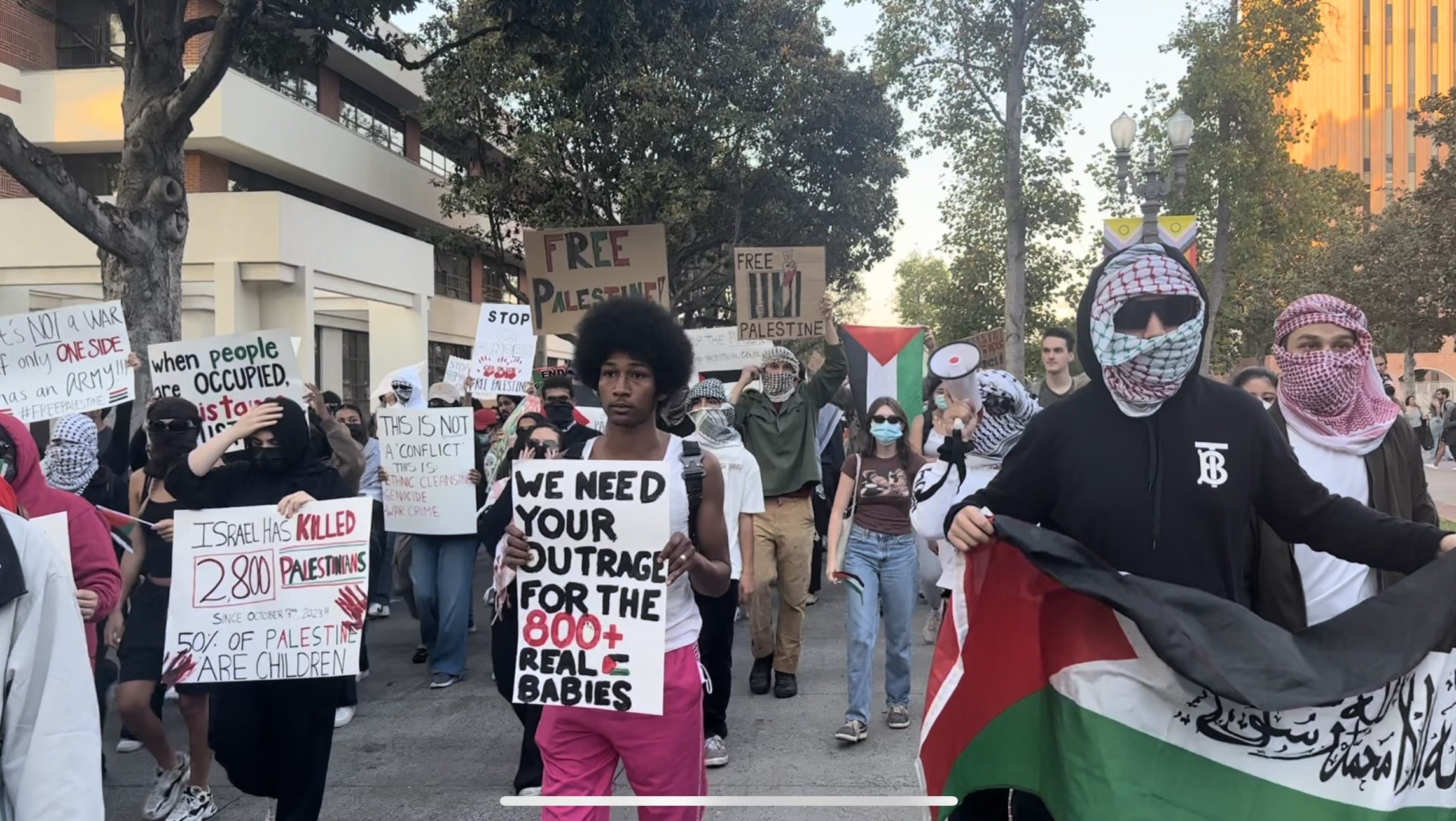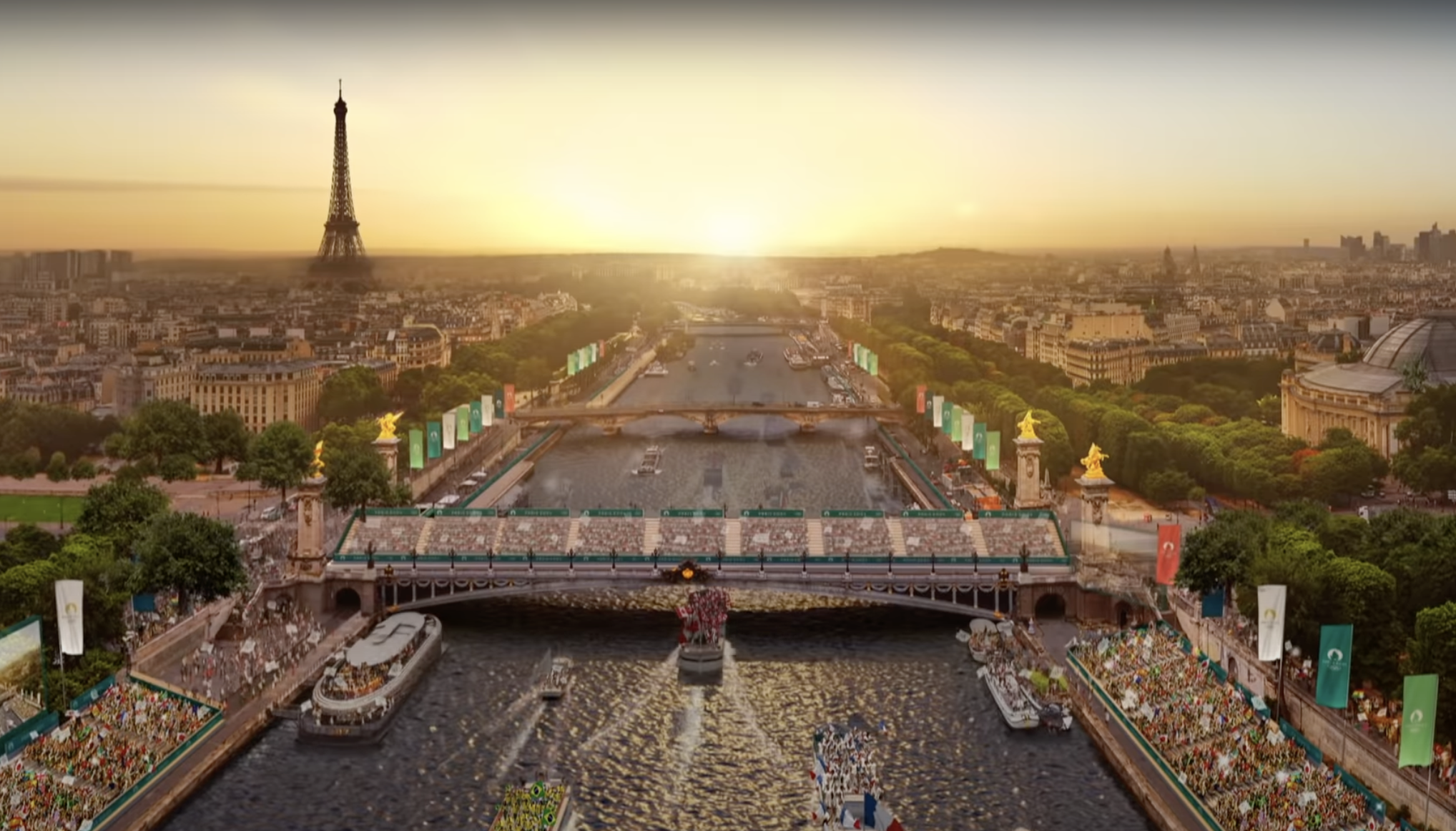From the front lines of campus unrest here in the United States, this dispatch from the University of Southern California, where the mood decidedly is, to be gentle, unsettled.
One of my best students in last year’s sophomore news writing cohort was personally called out, by name, at an on-campus protest—right in front of the j-school building that, you should know, is due to be the main press center at the 2028 LA Games. One of my current sophomore standouts, 19 years old, covering a rally, was so rattled by taunts she asked to be driven home in a police cruiser. She called me, her professor, from the back of the car, saying, am I going to be OK?
This, so we are all clear, is the key demographic — teens, college kids — the International Olympic Committee is seeking to draw to the Paris 2024 Games in eight short months. Prediction: uphill climb.
A recent scene on campus at the University of Southern California
Neither of these young people, for emphasis, was physically hurt. Let us be direct, though: we are living on the edge. For the first time in my 13 years as a full-time professor, we have security guards in both j-school buildings. When Russia invaded Ukraine, this was not the case.
We are heading now into final exams. I don’t know anyone on my campus – and many, many more – who isn’t ready for the fall semester to come to a close. Will things be different in January? Why should they be?
It is against this backdrop that the IOC on Tuesday issued a self-styled “communique” that, at its aspirational best, urged the world’s political leaders to “give peace a chance” and expressed “confidence” the Paris Games will “be a symbol of peace and unity.”
The IOC ‘Summit’ Tuesday that produced the ‘communique’ // IOC
The statement asserted of the Paris 2024 Games, “They will unite billions of people around the world behind a shared vision of peaceful competition.”
It says here: let us hope this wish manifestly is realized.
The Olympics, at their core, are perhaps the world’s best chance at building peace, one-to-one, the way — with understanding, grace, tolerance and empathy for each other — that we human beings can move to effect change. It’s why the enterprise is in its third century, and why the five rings are recognized everywhere.
Now let us pivot back to the real world, the one we all live in.
One, it is clear some number of Russian participants will be in Paris, as neutrals. This communique even gives them for the first time a formal acronym – AINs, or Individual Neutral Athletes.
The IOC loves acronyms. When you get an acronym, you are in. All that remains, absent an unforeseen turn, are a few squiggly details that will be worked out. Probably by, say, March.
Two, unless and until the war in Ukraine is resolved, it is contributing significantly to what the IOC president, Thomas Bach, has called our “aggressively divisive” moment in history, particularly as it affects the nations of the West. This especially means, in this context, France.
Three, the barbaric assault by Hamas on Oct. 7 triggered not just war in Gaza but waves worldwide of virulent emotion and, predictably, violence.
In what French president Emmanuel Macron called a terrorist attack, a man armed with a knife and hammer killed a German tourist and wounded two people late Saturday near the Eiffel Tower. The 26-year-old suspect, a French national, had pledged allegiance to Islamic State in a video recorded beforehand, authorities say.
As Reuters noted in a story about the attack, European security officials have warned of a growing risk of attacks by Islamist militants amid the war in Gaza, with the biggest threat likely from “lone wolf” assailants who, of course, are difficult to track.
The corollary, and let us be clear: antisemitism is a motivating factor in our world as it is. Let there be no doubt. None.
The deputy mayor of France, as the Israeli press has reported, was asked recently, “Do you think that there is a future for Jews in France?”
Her reply: “I don’t know how to answer that.”
This is the question and answer with the deputy French mayor, reported in the Israeli press — the banner says, “Israel at war” // Israel from the Inside with Daniel Gordis
This is a country where the French word for Jew, ‘Juif,’ is often inverted into the slur ‘Feuj,’ as in, “It’s just the Feuj.” Think back, if you will, to the Hypercacher kosher supermarket siege in 2015, where a terrorist murdered four Jews, after the Charlie Hebdo massacre.
Reuters again: France saw 1,159 antisemitic acts in the month after Oct. 7. That was three times more than the number of such acts in 2022.
All of this is context and background for the idea that has been proposed for the opening ceremony at the Paris 2024 Games.
From a Paris 2024 concept video of the opening ceremony
Typically, of course, an opening ceremony is held inside the track and field stadium.
Paris 2024 officials, sparked by the success of the Buenos Aires Youth Games in 2018, which saw hundreds of thousands of people gather around the Obelisk in the city center, came up with the idea of having a parade of boats – with athletes on them – cruise down the Seine.
On the banks, hundreds of thousands of people could gather to cheer.
This is the idea.
After the Eiffel Tower attack, the French sports minister said there was no “Plan B” for the ceremony.
In full, this is exactly what the minister, Amelie Oudea-Castera told France Inter radio: “We have no Plan B, we have a plan in which there are several sub-plans with a certain number of adjustment variables.”
This is nonsense word salad.
So is this from the IOC communique, about Paris 2024,” the first of a new era”: “They will be younger, more inclusive, more urban and more sustainable.” This “urban” part is, in part, why the Seine idea has been, well, floated. It’s also why breakdancing, or, in Olympic jargon, breaking, is on the Paris program. But the IOC is not consistent. LA28 will not be “urban” in the same sense — breaking is a Paris one-off and the five new sports for LA include four team sports, flag football, cricket, baseball/softball and lacrosse, and one outlier, squash, none of which are remotely “urban.”
So much for the “new era.”
Imagine trying to defend, if the worst of the worst came to pass, the decision at a Commission of Inquiry to go ahead with an ill-conceived flotilla because of a one Games-only commitment to “urban.”
Better some plain talk from Frédéric Péchenard, former director general of the National Police, who, because he is no longer in that position, would seem to have far more freedom to speak plainly. He said Oct. 7 has changed everything:
“Will [precautions] be sufficient to monitor tens of thousands of people, hundreds of apartments? It is up to the Minister of the Interior and the government to make decisions. I think it would not be completely absurd and I imagine that it must be done to think of a possible Plan B,” particularly for the ceremony, “if terrorist acts were to continue in our country,” which, obviously, and at the Eiffel Tower, they are, in fact, happening.
If in theory the boat idea once had some appeal, common sense says now is the time for Plan B.
Paris is not Buenos Aires. The Youth Games are not the big Olympics. 2024 is not 2018. The war in Eastern Europe and, moreover, the trigger that was Oct. 7, 2023, have changed everything.
Let’s say you are the Israelis. Do you really want to be isolated on a boat in the River Seine?
It should be noted that the Israeli delegation will be bigger than usual — the men’s soccer team qualified for the Games for the first time in nearly 50 years.
The Wall Street Journal on Monday identified a Ukrainian sniper who claims he killed a Russian officer from two miles away.
With that in mind, some things, to use the language of law, are reasonably foreseeable:
Is it really possible, as Péchenard suggests, for the French authorities to lock down every single apartment window on the River Seine? Do the French want 2024 to be their version of Nov. 22, 1963, and the grassy knoll?
Armed drones have revolutionized warfare. Is it really possible for the authorities to keep out a teeny-tiny drone over the length of the river cruise?
By the way, it’s not just the Israelis with reason for concern. If the order of the teams goes according to the French alphabet, Ireland and Iceland would be immediately in front of the Israelis, Italy just behind. Wait until they figure that out, and see if they want their athletes to be on a boat in the river.
The IOC just days ago handed France – and rising star David Lappartient, head of both the French national Olympic committee and the cycling federation – the 2030 Winter Games. No one —and this can’t be emphasized enough, no one — wants a repeat of 1972 and Munich, least of all Bach, who is German and knows well the history. Does Lappartient want to run the risk to his considerable ambition?
Again, common sense, please.
The IOC does well to traffic in aspirational ideals. Again, peace is its core mission. Regrettably, we live in a world torn by violence. And as the IOC repeats, mantra-like since 1972, security is priority No. 1.
Let’s not all regret trying to secure a considerable stretch of the River Seine, an implausible if not impossible idea, for the point of a ceremony. No one’s life is worth it.





